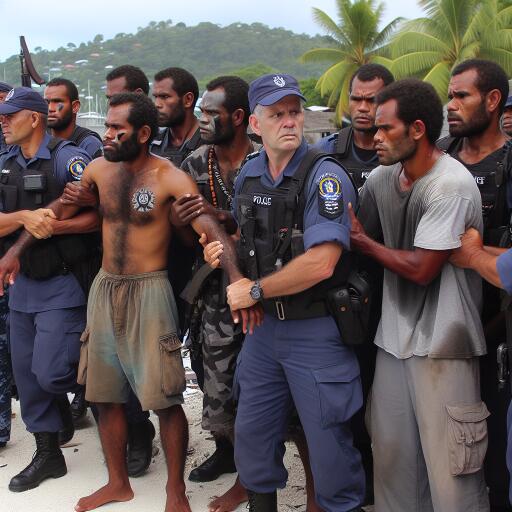Escalation in New Caldonia: Arrests Amidst Independence Demonstrations
In a significant turn of events that has caught the international eye, New Caledonia has witnessed the arrest of eight prominent figures linked to pro-independence demonstrations, marking a critical point in the region’s ongoing political unrest. These individuals are closely associated with the Field Action Coordinating Cell (CCAT), a pivotal group under the Union Calédonienne (UC), known for its staunch pro-independence stance within the larger FLNKS (Kanak Socialist National Liberation Front) coalition. The arrests underscore the growing tensions in the region over the quest for independence and the violence that ensued recently.
The arrests were executed in an extensive operation spearheaded by the gendarmerie, focusing on CCAT’s base in the Magenta district of Nouméa and extending to the suburban areas of Mont-Dore. This initiative is part of a broader judicial inquiry led by France’s anti-terrorism division, aimed at dissecting the roots and ramifications of the riots that erupted on May 13. The aftermath of these protests has seen an upheaval that New Caledonia hasn’t witnessed in decades, drawing parallels to the civil unrest of the 1980s.
As outlined by the Public Prosecutor, the inquiry is exploring several grave charges, including conspiracy to commit crimes, organized destruction through arson, and complicity in crimes against public authority officers. These charges highlight the severity of the disturbances and the government’s firm stance on restoring order and uncovering the truth behind the violence.
Christian Téin, a leading figure of the CCAT, is among the arrested, raising concerns about the future direction of the pro-independence movement. The arrested individuals have been granted their fundamental rights, such as legal assistance and medical examination, underlining the authorities’ commitment to a fair inquiry process.
This operation aligns with additional efforts aimed at curbing unrest, including a police raid at the headquarters of the USTKE union, a significant entity within the CCAT. The backdrop to these arrests is a series of pro-independence protests that devolved into chaos, resulting in considerable economic and personal loss, with hundreds of businesses and homes destroyed, and thousands of jobs lost, culminating in financial damages surpassing one billion Euros.
The Union Calédonienne has vehemently denounced the arrests, labeling them as an undue intimidation tactic by the French state. The party’s leaders are advocating for calm and restraint among its followers, urging a peaceful response to what they perceive as provocations by the authorities and on social media platforms.
Contrastingly, pro-France factions within New Caledonia have welcomed the arrests as a necessary precursor to resuming dialogue on the territory’s future status. Notable political figures have expressed relief and anticipation towards a potential normalization of relations and a definitive agreement on New Caledonia’s autonomy.
However, the path to reconciliation and understanding appears fraught with challenges. The FLNKS’s congress postponement, due to internal discrepancies and perceived security concerns, illustrates the deep divisions that loom over New Caledonia’s quest for self-determination. With both sides of the independence debate preparing for the next steps, the international community watches closely, hopeful for a peaceful resolution that respects the aspirations and rights of all New Caledonians.
As this situation continues to evolve, the actions taken in the aftermath of these arrests will be crucial in determining the course of New Caledonia’s political landscape and its pursuit of independence or integration within the French Republic.








